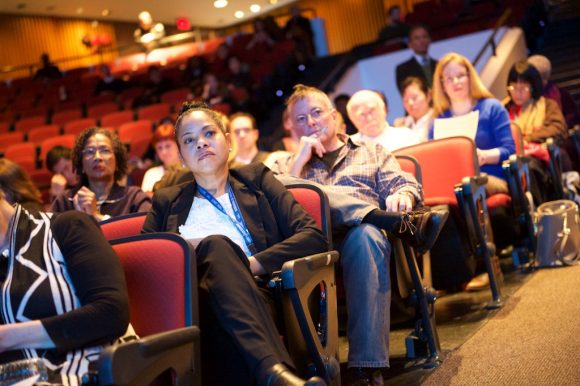As a large, urban college, BMCC has a large, urban faculty. It’s difficult to communicate with them–in any direction. We find ourselves relying on small groups, some elected such as department chairs and academic senate, and email. Our web site posts information. But where is dialogue? Thus we attempted a large social gathering with a message.

The first BMCC Faculty Convocation was held at BMCC last week. On a Friday. In January. It was nice. Here’s a piece from the public affairs office:
The Borough of Manhattan Community College (BMCC/CUNY) Office of Academic Affairs hosted the College’s first annual Faculty Convocation on January 27 in Theatre I at 199 Chambers Street.
BMCC President Antonio Pérez opened the event attended by hundreds of full-time and adjunct faculty. “As we assess and measure student success, we have to take into account things that are constantly changing in our city,” he said, referring to the economic climate and social issues. He also emphasized, “What happens in the classroom is at the heart of student success.”
Karrin E. Wilks, Provost and Senior Vice President for Academic Affairs, presented a talk on challenges in the community college classroom and evidence-based strategies for addressing them.
“It is our goal to bring faculty together and have a collective conversation about teacher and student success,” she said, one that creates “a collaborative culture; a culture of inquiry based on shared guiding principles.” She referred to guiding principles such as, “Students can learn anything under the right condition” and “Access to success is fundamental to advancing equity … but access is not enough.”
One of our aims was to continue a collegewide dialogue about student success. Another was to make teaching more public. To do that, we invited the winners of the 2016 Distinguished Teaching Award to address the group. (The award was given for the first time in 2016.)
In Tali Noimann’s talk, “(Em)power in the Classroom,” she examined the importance of creating an environment in which students have the freedom to self-teach and peer-teach. “Student centered means relinquishing the power that we think we have in the classroom,” she said. “The less I do, the more they learn.”
Nick Marino described four concepts for student success in the classroom: unity, compassion, authenticity and discovery. “Yes, model the rigors of scholarship,” he said, “but revisit, revalue and revise what we say in response to the world of our students, as it changes around us.”
John Beaumont talked about faculty’s role in student success, with a focus on “how to stay aware, and in tune with what is happening in the classroom.” He questioned the validity of assigning labels to the learning environment; for example, “labeling our classrooms as ‘interactive’, or our students as ‘communicative’,” and challenged teachers to look closely at whatever labels they assign to themselves, as well.
After lunch, faculty led other faculty in discussions of teaching and teaching strategies, such as Research in the Classroom, Online Learning, Flipped Classes, and Internships.
I think we met a lot of our goals, particularly giving faculty an opportunity to see one another and talk about teaching. Pending results of the assessment of the event, I think we’ll do it again.


